“Blood Oath”
Written by Peter Allan Fields
Directed by Winrich Kolbe
Season 2, Episode 19
Production episode 40512-439
Original air date: March 27, 1994
Stardate: unknown
Station log. Quark summons Odo to get a Klingon out of a holosuite. He’s in past his paying time, and he won’t leave, threatening to kill Quark if he shuts off power to the holosuite. He’s reenacting the Battle of Klach D’Kel Bracht, poorly, according to Quark. Odo orders him to shut off the power. “He’ll kill you!” Quark says. “No,” Odo points out, “he’ll kill you.”
Quark cuts the power, and a very old Klingon holding a mostly empty bottle of booze stumbles out. Odo declares him the victor and says the people are waiting to celebrate his victory. “Lead the way then!” the Klingon drunkenly declares, and Odo dumps him in a cell to sleep it off.
Another old Klingon, this one in uniform and calling himself Koloth, shows up in Odo’s office without him knowing. Koloth identifies the prisoner as being Kor, and them both as Dahar masters. Odo actually apologizes, and offers to release Kor to Koloth’s custody—but when Koloth sees how drunk Kor is, he tells Odo to keep him, and storms out.
When Odo tells Kira about his “Klingon afternoon,” Dax overhears and recognizes the players. She goes to the security office to find Kor singing very badly. Dax takes responsibility for Kor, who remembers Curzon Dax as one of his oldest friends—and is rather surprised to realize that Jadzia is the new host.
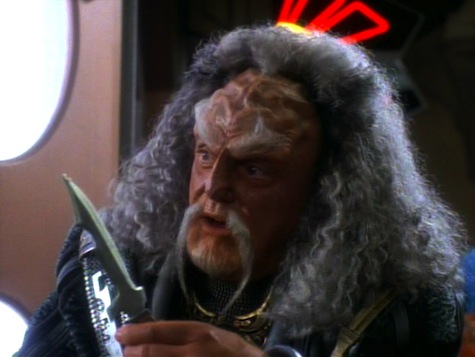
They find Koloth at the replimat, using a dagger to cut his cake. He’s equally shocked at the new Dax host, as is Kang, who arrives dramatically, announcing that 81 years later, he has finally found the Albino. Dax, making it clear that the blood oath she took as Curzon 81 years ago to wreak vengeance on the Albino for killing the first-born sons of all three Klingons still applies to her, takes them to her quarters, where Kang explains that he has found the Albino on Secarus IV, where he’s been living for 25 years.
Kang and Dax walk and talk along the Promenade. Dax tells Kang that Curzon was deeply honored by Kang’s making Curzon godfather to his son—the same one the Albino killed. Kang also didn’t know that Curzon was dead—for security reasons, the four of them have avoided staying in touch with each other. Kang laments the good old days, talking about how Klingons are now opening restaurants and serving racht to the grandchildren of people he killed in battle. He releases Dax from the blood oath.
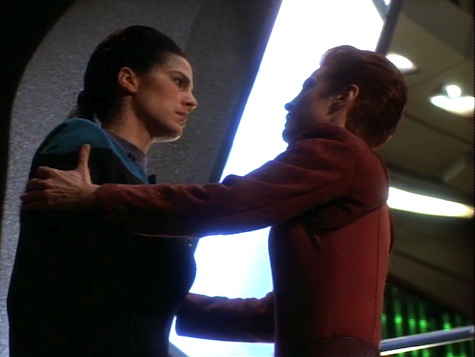
In Ops, Dax asks Kira some rather blunt questions about how many people she killed while she was in the underground. Kira’s evasive-yet-honest answer is “too many.” After prompting from Kira—who doesn’t particularly want to have this conversation—Dax gives the full story: Kang, Kor, and Koloth were sent after some pirates 81 years ago. The leader of the pirates was an albino who evaded capture, and swore to kill the first-born sons of all three Klingons. He was successful a few years later.
Kira insists that Dax has no obligation to them, as it’s Curzon’s blood debt, and Dax admits that Kang feels the same way. But she feels obligated. Dax still remembers the funeral of Kang’s son, who was named Dax for Curzon.
So Dax gets to work on the Klingons. She starts with Kor, who’s drinking with a couple of dabo girls. Kor is on her side, but he doesn’t feel he can change Kang’s or Koloth’s minds. He laments that he was once far less than can be seen (patting his belly) and far more than he has become.
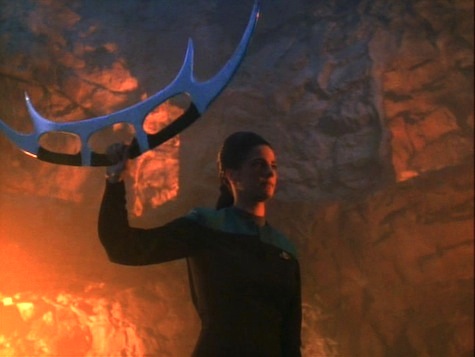
Koloth is next, up in the holosuite practicing with his bat’leth. He dismisses Curzon’s participation in the blood oath as a political gamble to curry favor and make his job easier. He also believes that Dax would be a liability. To prove otherwise, she has the holosuite give her a bat’leth of her own. She gives him a good fight, though Koloth does win eventually—however, he deems her worthy of being included in the quest.
Kang, though, refuses to allow her to come along. Dax, for her part, refuses to give up, pointing out that he can’t let her dishonor herself by not fulfilling the oath. Kang won’t let her die in Curzon’s place, but she has no intention of dying—Kang finally gives in. “Come and fight with us—come and be damned!”
However, Dax has one more obstacle: Sisko, who refuses to grant her a leave of absence. Dax, though, will disobey a direct order if she has to, so Sisko lets her go.
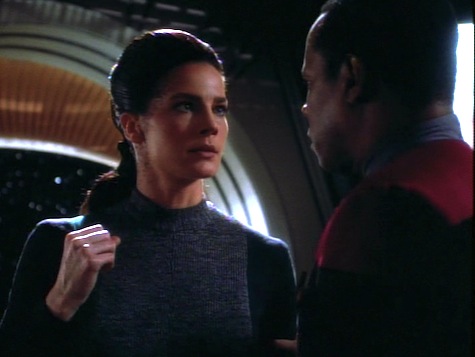
On Kang’s ship, he shows the others the layout. There are 40 guards posted at standing intervals 75 meters apart. Dax thinks that’s insane: no patrols, and too far away to see each other? They don’t think the Albino’s that stupid, but Kang says it doesn’t matter. They will assault directly upon the Albino’s fortress—which strikes Dax as equally insane. It’s not a battle plan, it’s a suicide plan.
Kang finally admits to the real reason why he didn’t want Dax along. He’s been in contact with the Albino and made a deal with him for one last glorious battle. It is, Kang says, their last chance.
However, Dax is a Star Trek science officer, so she proposes another way involving technobabble: bombard the surface with tetryons, which will make the guards’ energy weapons useless. It’s not something Curzon would’ve been able to do, but it’s right up Jadzia’s alley.
The quartet beam down. We see at least one roving patrol, so there’s one lie, and then Dax’s tricorder reveals a mine at the very threshold Kang agreed they’d attack at. So much for honorable combat. Koloth determines that the Albino is truly inside—given the other deceptions, it would just figure that he would go so far as to not even be there—so Dax sets up a diversion at the armory (by blowing it up) while the others destroy the fortress’s sensors.
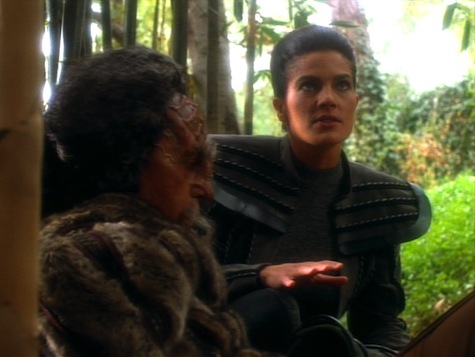
To the Albino’s credit, he doesn’t fall for the diversion and immediately figures out that the phasers don’t work because of something being done by a cloaked ship in orbit. However, without phasers, the guards are comparatively easy prey. Still, the numbers are still 10-1 against our heroes, and Koloth and Kor are both wounded, Koloth fatally so.
Kang, though, makes it all the way to the Albino—who’s been hiding behind the guards. However, the Albino wins the fight and stabs Kang after shattering his bat’leth. Dax threatens him with her bat’leth, but she can’t strike the killing blow. The Albino decides to torment her a bit, but his villainous gloating proves his undoing, as it gives Kang a chance to stab him in the back with his d’k tahg. Kang dies, thanking Dax for letting him strike the killing blow. Only Kor and Dax survive.
Dax returns to Deep Space 9 and takes her station, exchanging silent, significant looks with a peeved Sisko and an understanding Kira.
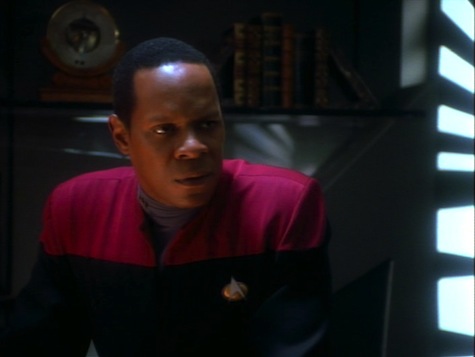
The Sisko is of Bajor. Sisko has been a bit of an apologist for Curzon’s behavior in the past (notably in “Dax” and “The Forsaken” and “Invasive Procedures”), but he flat-out says he doesn’t get the blood oath, doesn’t get Curzon swearing to murder someone.
Don’t ask my opinion next time. Kira is Dax’s best sounding board, as she’s been down this road too many times before in her life, and she warns Dax that when you kill someone, you kill a bit of yourself too. Dax hits a nerve when she asks if the people she killed were all faceless Cardassians or if they were actually people. (Of course, we know one of her victims was a Bajoran, but never mind…)
The slug in your belly. We already knew that Curzon was a Federation negotiator, and we learn in this episode that he had quite a history with the Klingons. Kang credits him with being the first Federation diplomat who actually understood Klingons. (One wonders if he ever worked with Riva…)
What happens on the holosuite stays on the holosuite. Quark got some holosuite programs of ancient Klingon battles from a Klingon captain who came through the wormhole, including the Battle of Klach D’Kel Bracht. There’s apparently also a generic cave program that’s perfect for bat’leth drills.
Preservation of mass and energy is for wimps. Odo has never rolled his eyes so many times in so short a period of time as he does in the teaser and Act 1, most of them revolving around Kor’s drunkenness. He complains to Kira of having “a Klingon afternoon,” a particularly entertaining Odo Rant (pat. pending).
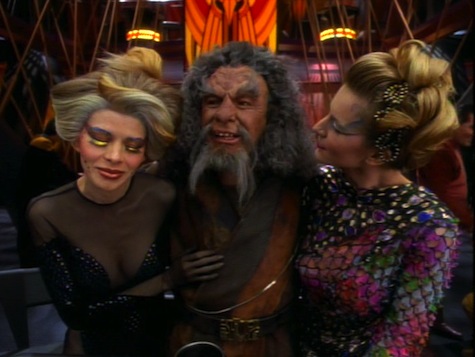
No sex, please, we’re Starfleet. As soon as he realizes that Dax is now a woman, Kor wants to kiss her. She talks him down to a hug. Later, we see him with, not one, but two dabo girls.
Keep your ears open. “There is tension on your face, Koloth! You ought to drink more!” –Kor giving useful advice while Koloth and Dax are sparring.
Welcome aboard. Christopher Collins, who played a different Markalian in “The Passenger,” is the Markalian assistant to the Albino; he also showed up twice on TNG, as Captain Kargan in “A Matter of Honor” and Grebnedlog in “Samaritan Snare.” Bill Bolender plays the Albino, and does a fine job of making you really hate the sonofabitch with only a few lines.
But the big guests here are the triumphant returns of original series guests Michael Ansara as Kang, first seen in “The Day of the Dove,” William Campbell as Koloth, first seen in “The Trouble with Tribbles,” and John Colicos as Kor, the very first Klingon we ever met, in “Errand of Mercy” (Koloth and Kor show up again on the animated series, in “More Tribbles, More Troubles” and “The Time Trap,” respectively, but they were both voiced by James Doohan). This is Campbell’s only appearance on DS9, though he also played Trelane in the original series’ “The Squire of Gothos.” Ansara will return as Jeyal in “The Muse,” and also reprise the role of Kang in Voyager’s “Flashback.” Colicos will come back twice more as Kor in “The Sword of Kahless” in the fourth season and “Once More Unto the Breach” in the seventh.
Trivial matters: This episode drove a stake into the heart of one of the many theories proposed as to why Klingons looked mostly human in the original series but had cranial ridges starting in Star Trek: The Motion Picture. One notion was that there were simply two types of Klingons, the ones with smooth heads and the ones with ridges, but Kang, Kor, and Koloth appearing in this episode with ridges, after being without in their original series appearances, put the kibosh on that one. The explanation for the discrepancy would at last be provided in the Enterprise episodes “Affliction” and “Divergence.”
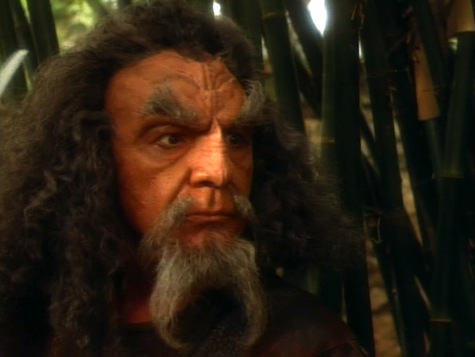
This episode spells out that Trills are not required to carry the obligations of previous hosts forward. It would’ve been nice if someone brought this up in “Dax,” but Jadzia had good reason to stay quiet about Curzon’s indiscretions there, so she wasn’t about to help the case against her.
Klach D’Kel Bracht will be established in the Enterprise episode “The Augments” as the Klingon name for the region known as the Briar Patch, first seen in Star Trek Insurrection.
This is the first time a bat’leth has appeared on DS9. It is far from the last, especially once Klingons become a major presence in the fourth season.
Kor makes a comment about Kang making a deal with the devil. Hilariously, Kang said in “Day of the Dove” that Klingons have no devil.
The backstory of this episode is told in the Excelsior novel Forged in Fire by Andy Mangels & Michael A. Martin, detailing the burgeoning friendship among Curzon Dax and the three Klingons (which should totally be a band name). That same novel serves to explain how Klingons all wound up with ridges again, and also gives the Albino’s name as Qagh.
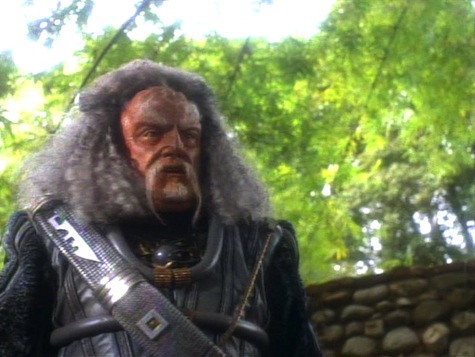
By virtue of their appearances on the original series, the number of pieces of tie-in fiction featuring Kor, Kang, and/or Koloth are legion, and their showing up eight decades of story time later on DS9 just made them more prolific, so listing all the times they were used in prose and comics form would take forever. However…
Koloth featured heavily in Dayton Ward’s In the Name of Honor, attempting to reconcile the dandy of “The Trouble with Tribbles” with “the iceman” of this episode. (The novel also provides one of the pre-Enterprise attempts to reconcile the smooth-head-vs.-bumpy-head conundrum.) Koloth also played a major supporting role in the Errand of Vengeance and Errand of Fury trilogies by Kevin Ryan. Koloth’s last mission before going after the Albino was seen in a brilliant backup story in DC’s Star Trek: The Next Generation Special #3, “Old Debts” by Ryan, Ken Save, & Shephard Hendrix (he wanted his last revenge against his enemies, including against Scotty for leaving all those tribbles in his engine room). Koloth won’t actually appear onscreen in “Trials and Tribble-ations,” but Dax’s memories of Koloth’s stories about his encounter with Kirk at Station K-7 will play a role in the episode.
Kor shows up in a couple of works by your humble rewatcher: the Lost Era novel The Art of the Impossible, in which Curzon Dax is able to get some important information from Kor, and the Slings and Arrows novella Enterprises of Great Pitch and Moment, where Jadzia Dax and Worf are able to do likewise. (In both cases, they find him getting drunk at a particular bar.) He also appears in two of the Day of Honor novels, Treaty’s Law by Dean Wesley Smith & Kristine Kathryn Rusch and Armageddon Sky by L.A. Graf.
Kang is the focus of your humble rewatcher’s Alien Spotlight: Klingons comic book, art by JK Woodward, which shows him at three points in his life, one of which is him caring for the Albino’s discarded wife on Dayos IV until she dies, as mentioned in this episode. He also appears in The Art of the Impossible, playing a role in the ascension of K’mpec (from TNG’s “Sins of the Father” and “Reunion”) to power.
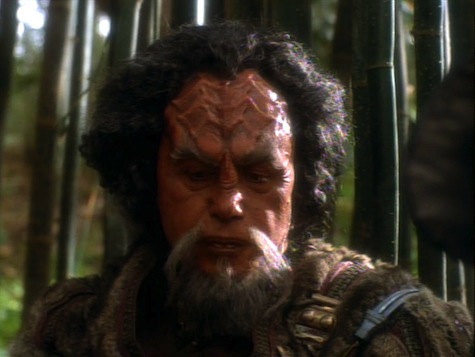
The beginning of the friendship among the three Klingons in the 23rd century is shown in your humble rewatcher’s novella “The Unhappy Ones” in the Seven Deadly Sins anthology. Their TOS appearances were also shown from a Klingon perspective in three issues of the IDW comic book miniseries Blood Will Tell by Scott & David Tipton and David Messina.
Your humble rewatcher’s upcoming tome The Klingon Art of War will provide the origin of the term Dahar master, and will also feature anecdotes regarding Kor, Kang, and Koloth.
Walk with the Prophets. “Look upon your executioners, killer of children!” What a great episode. It’s an epic story of vengeance and camaraderie and betrayal and glory and ethics, it’s got a big beautiful look to it (the best TV director in Trek history, Winrich Kolbe, was very much the right person for this), and it’s a showcase for five superb actors at the top of their game.
The choice to have the three most prominent Klingons from the original series reprise their roles can be viewed as contrived, especially since the only one who acts the same as he did in the 1960s is Michael Ansara. Still, it’s been a very long time, and people do change as they age. The only one that is hard to swallow is Koloth, who was a prissy fussbudget in “The Trouble with Tribbles” and is so totally not that here; on the other hand, it’s not much of a stretch for the Kor of “Errand of Mercy” to age into Falstaff.
In truth, the choice can be viewed as self-indulgent—but it also adds a lot more meaning to the story. A lot of why Klingons became a major part of Trek lore was due to the sheer charisma of these three actors (if the only Klingons we ever saw were the two doofuses from “Friday’s Child” and “A Private Little War,” nobody would’ve given a damn), and having these three be the guest protagonists of this particular tale adds weight.*
*At least, if you recognize them. Zack Handlen of The AV Club had forgotten that these were the same Klingons from the original series in his review of “Blood Oath,” and it didn’t affect his good opinion of the episode in either direction. To him, it was just an added detail for eagle-eyed fans, but made the story neither more nor less effective.
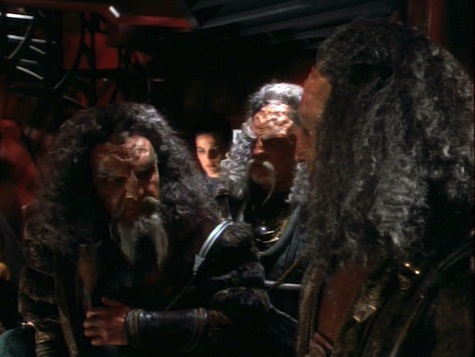
Plus, the three of them are so good. Michael Ansara has more gravitas than pretty much anyone, although here’s it’s leavened by a weary exhaustion. He’s still the unquestioned leader of the group, and everything rotates around him. Ansara has the kind of charisma that the best leaders exude: always the center of the room the moment they walk into it. (It’s what made him a worthy adversary for Kirk in “Day of the Dove,” as he took over the screen every time he was on it.) But you also get the sense that he’s had enough, viewing himself as a relic of a bygone age, and wants to go out in the blaze of glory he feels he and his friends deserve. (He tries to cut Dax out only after he realizes that he isn’t an old man close to death anymore. His biased view of his old friend Curzon is someone who would want to go down swinging with his old buddies, and the revelation that she’s a young woman now alters his decision.)
William Campbell sets the tone of the incredibly focused old warrior who’s seen and done it all and only isn’t dead because he hasn’t yet met anyone worthy of killing him. (He’s actively offended by the notion of dying before Kor does.) His first scene, when he gets the drop on Odo, is a crowning moment of awesome. (“How did you get in here?” “I am Koloth.” “That doesn’t answer my question.” “Yes, it does.”)
But John Colicos is the heart of the trio. Ansara has the voice and Campbell the attitude, but Colicos brings the entire package. He has superb comic timing, the best one-liners, and yet still carries the emotional weight of the quest. His joy at reliving the Battle of Klach D’Kel Bracht over and over, his urgency when asking Kang if he’s finally found the Albino, his snarking off of Koloth in the replimat and on the holosuite, his bitter words to Kang when the latter’s betrayal is revealed, and his last words to Koloth promising that Klingon children will forevermore hear the story of his honorable life and glorious death.
Terry Farrell gets her second strong outing in three episodes, with the benefit of a much better storyline than she got in “Playing God.” I like the fact that Dax isn’t a hundred percent comfortable in the role of warrior woman—she handles herself competently when they storm the Albino’s lair, but not overwhelmingly, and tellingly she loses her fight with Koloth. And in the end, after her agonizing with both Sisko and Kira, when given the chance to kill the Albino, she doesn’t take it. She’ll defend herself (and she doesn’t kill any of the guards, either), but even though she feels the emotional need to avenge the death of her godson, she can’t do what Curzon swore to do eight decades earlier. Kang dies thinking she let him get the final blow, and it’s probably better that he believed that, but it’s obvious from Farrell’s expression, both in the fortress and back on DS9, that that’s not it at all.
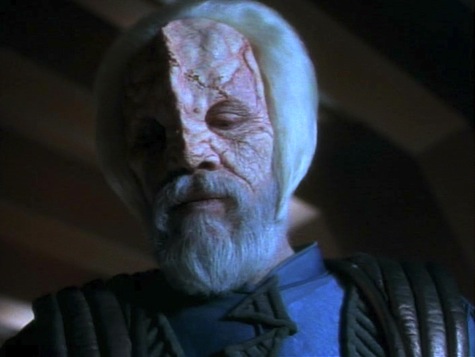
Speaking of the Albino, it tends to get lost in the hugger mugger of bringing the big three back that Bill Bolender gives a delightfully nasty-ass performance here. The Albino’s only onscreen for a little bit, but he lives up to his billing. He sees through most of their tricks, anticipates their tactics, and is also a spectacular asshole, hiding behind his employees, referring to Kor, Kang, and Koloth as “Klingon filth,” still taking joy in his execution of three children, and then finally his condescending (if perceptive) talk with Dax.
Sisko and Kira’s roles in this episode are nice reminders that what we’re talking about here is still pretty icky. It’s played for laughs when Kor goes on about how awesome it’ll be when they wade into battle and spill craptons of blood and who wouldn’t want that? But Sisko reminds the audience that we’re talking about taking a life, and Kira is there to tell us just what that means. They manage this while still maintaining Trek’s trademark cultural relativism: as Dax points out, this is Klingon justice, the proper moral way for a Klingon warrior to behave toward the person who killed his son.
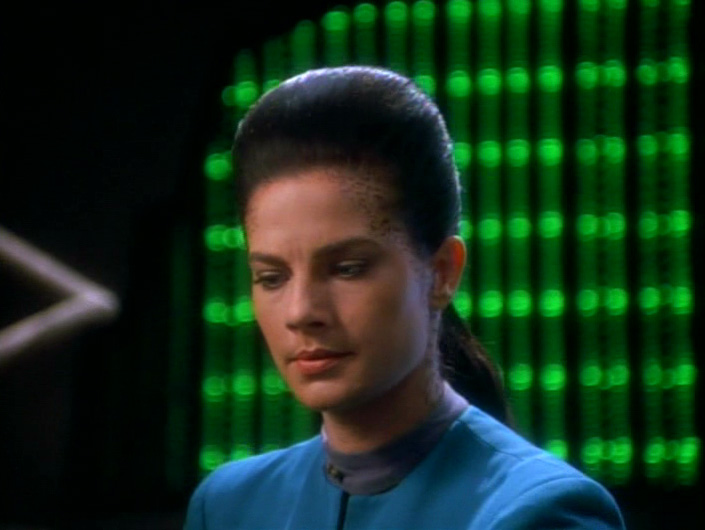
Best of all is the ending. Peter Allan Fields, more than any other Trek scripter, understands the value of a good silence, particularly at the end of an episode. The final scene works so much better for not having any dialogue, relying on the facial expressions of three actors (Farrell, Avery Brooks, Nana Visitor) who are really good at them in any case to carry the ending’s power.
Warp factor rating: 9
Keith R.A. DeCandido has written a butt-load of Klingon-focused fiction, including the novels Diplomatic Implausibility, A Good Day to Die, Honor Bound, Enemy Territory, A Burning House, and The Art of the Impossible, not to mention Articles of the Federation, A Singular Destiny, and A Time for War, a Time for Peace, which have plenty of Klingony goodness; short stories in Tales from the Captain’s Table, Mirror Universe: Shards and Shadows, and Seven Deadly Sins; the comic book Alien Spotlight: Klingons; and next year’s coffee-table book The Klingon Art of War.










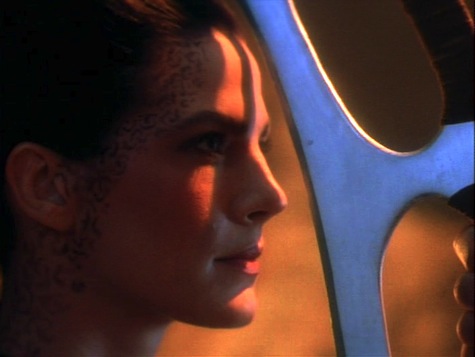
I always enjoyed the Klingons and this was a fun episode. I’m inspired to pick up some of those novelizations you mentioned. I’ve de-lurked, after following your rewatches for ages, to thank you for doing them.
And I always read the bio!
quick correction:
“Star Trek science officer”
I was under the impression she was in Starfleet.
My only issue with this episode was that the guard force was in the same class as Starfleet Red Shirts and the Empire’s storm troopers. A troupe of boyscouts could have provided more resistance. After all, these Klingons each had to be a century old, and I’m while that might be middle age for Vulcans, it is old by Klingon Standards.
This episode continues the pattern of DS9 handling cultural differences far better than TNG or TOS ever did. The Trill, Ferengi, and Klingons all get evolved quite nicely by the series as we get a chance to see they aren’t all from planet of the hats but rather get some nice variation. We see these three most honored klingons (although i don’t ever think we get the title “dahar master” explained to us) and they all have far different personalities. It’s sort of a refreshing change.
Also, Keith- is “buttload” a standard measurement that can be reproduced? After all, wouldn’t some individuals be able to load more Klingon fiction than others?
@3
You’d be surprised how much butt an old warrior can kick. There’s a reason for that stereotype of the wizened old martial arts master; they may not have the youth and energy anymore, but their sheer decades of practice and experience make them just as deadly if not moreso – as long as their body can still support their reflexes and muscle memory, ‘fighting someone stronger than them’ probably isn’t anything new.
As to this episode itself, I was on the edge of my seat when I watched it. I’m going through DS9 for my first time, and my familiarity with TOS (and TNG) is best described as “reasonably extensive but mostly second-hand”. I didn’t recognize Kor, and I thought Koloth sounded familiar, but when Kang showed up my approximate reaction was “Wait, what? …oh my god.” And then I looked up the other two and my jaw was on the floor. This episode did a great job of building from ‘fun romp with a drunk old warrior’ to ‘an intense tale of Klingon honor’, and I’m always up for a good old Klingon tale.
This was a good episode, though I didn’t realize the connection to TOS until now. I’ll have to go watch those episodes now.
One thing that bugs me, Koloth and Kor not knowing that Dax had changed hosts is plausible, but Kang’s surprise is puzzling. Why did he set the meeting on DS9 if not to meet Dax? And if he knew Dax was on DS9, why didn’t he know it was Jadzia Dax, not Curzon Dax?
Gonna date myself here, but I remember watching this with friends in ’94 who were all pissed off about The Big Point You Didn’t Mention–after the Albino was dead, did she eat his heart or not? At the time, none of us thought it was resolved and we all thought it was a total cop out–some of us thought that even though she couldn’t bring herself to strike him down, she might have participated in the post-mortem ritual, because it was a ritual and part of the oath.
This is how you do fan service. Everything really works here, it’s astounding. Perhaps the episode’s best trick is almost instantly making us sympathize with these three Klingons that we are most likely to think of as enemies. I was actually saddened and a little bit angered by the deaths of Kang and Koloth. Of course, it’s the way they would have wanted to go, but I really felt like they had a few more good battles in them. At least Kor gets his redemption.
And this is also a big step on Jadzia’s path to being a fairly kick-ass warrior herself. She learns a tough lesson that Kira and Sisko (and most likely O’Brien) know well and she will need that tempering in the years to come.
@3 I’m with you on the term “buttload”, which is the result of too many people not connecting the “unsanitized” term to the fact that an ass is a beast of burden ( the same type of animal that Jesus rode into Jerusalem ). Just another one of those niggling little annoyances that has crept into our language.
I remember watching this episode in the day, back when I was actually starting to get into the show. I was enough of an original Trek nerd to have the reference books handy to verify the list of guest stars.
This is a terrific episode, and I say that as someone who’s not overly fond of all the Klingon blood-and-honor-and-death nonsense. (There’s no honor in actively seeking to kill people, I don’t care how you dress it up.) It’s another great Dax episode, and there’s terrific stuff for Kira and Sisko too. And rather than just indulging in the space-Viking stuff, it acknowledges the moral difficulties of what the Klingons are asking Dax to do.
It is a huge coincidence that the three main Klingons we saw in TOS all happened to be good friends and knew Curzon. But maybe not a completely implausible coincidence. Logically, if Kirk encountered them all within the span of two and a half years, it means they would’ve all been serving in a similar part of space at the same time, and thus would’ve had occasion to interact and become friends. So it’s not a total reach, but it’s a reach.
Mainly it’s great to see Colicos and Ansara again (I was always lukewarm about Campbell), so I can forgive the fact that Kor and Koloth are written completely unlike their original characters. Though Colicos was a lot more convincing as Falstaff than Campbell was as… sorry, can’t think of a good literary analogy for his character type here.
I may have mentioned this before, but I’ve been watching The Man from U.N.C.L.E., a show Peter Allan Fields wrote for a lot in the ’60s, and his episodes there tended to objectify female characters to a degree that feels misogynistic and creepy today. But here he is on TNG and DS9 writing strong, impressive women like Lwaxana, Jadzia, and Kira. It’s a huge change for the better.
I was unsure whether it was correct that Doohan played both Kor and Koloth in TAS. The problem is that a lot of the guest voices in TAS were uncredited, and the ’90s edition of the Star Trek Concordance sloppily and falsely attributed all of the male ones to Doohan, and Memory Alpha has perpetuated that egregious error. (I think many of the characters credited to Doohan were actually played by Lennie Weinrib, who played most of the male supporting cast in Filmation’s ’77 Batman series, but I’m not certain.) But I double-checked on Netflix, and yes, in these cases at least, the attribution is correct. Both are Doohan, and he is trying to do at least broadly similar voices to Colicos and Campbell, though his Kor is rougher and less suave than Colicos’s.
As far as the forehead theory goes, after this episode aired I formulated a variant of the “two Klingon species” theory — that there was one species that was born ridged and another that started out smooth and grew ridges after the first few decades of life. (Chang from TUC, with his barely-there ridges, would’ve been an intermediate stage in the transition.) But I never really got the opportunity to propagate my theory.
Of course, the producers were probably following the precedent Roddenberry set with ST:TMP. When fans asked why Klingons looked different in the movie, he said they’d always looked that way and TOS just couldn’t afford to show it correctly. And canon pretty much followed suit with that until the reuse of TOS Klingon footage in “Trials and Tribble-ations” required them to acknowledge the difference as something real in-universe.
But if you look closely at the makeup, Michael Westmore sort of compromises: He gives these three ridges, but smaller ridges and hairlines that are further forward than most of his Klingons (at least with Kor and Kang). So he’s sort of making a slight concession toward the original look. Also, their beards are similar to the beard styles they had in TOS, I think.
But really, aside from reusing the same character names and actors, there’s no proof in “Blood Oath” that these are the same Kor, Kang, and Koloth who met Kirk. Hypothetically they could’ve just been namesakes belonging to the ridged race. I think the episode was being deliberately ambiguous about that. It isn’t until Kor’s later appearances that he mentions facing Kirk on Organia, confirming that he’s the same guy.
Glorious episode! Lots to like here. (And a belated R.I.P. to Michael Ansara. Magnificent actor with a magnificent voice.)
By the way, wasn’t one of the Albino’s goons played by Chris Latta? Thought I heard Cobra Commander….
Oh yeah, Christopher Collins. I forgot he went by two names.
I didn’t know Christopher Collins was Chris Latta! I did notice that Captain Kargan had a similar sound to his voice, but I never realized he was actually the same guy.
#12
Yep, Collins/Latta had a pretty good stand-up act too. Check youtube. There’s a video of him with none other than William Shatner hosting… some comedy club.
There are four buttloads in a crapton.
@14, Metric buttloads or standard?
I remember watching this originally in the 90’s and being really excited that all three of the TOS Klingons could appear again. I was just confused as to why they had ridges, but was really impressed with their hair. This remains one of my all time favorite episodes of DS9.
Worf’s non-answer to the “ridges question” in “Trials and Tribble-ations” was far better than what Enterprise came up with, and it’s on display here!
I think this episode is where DS9 finally lifts off out. There have been great episodes before this point, but from here on out it will be much more consistent. I don’t think there’s a dud in the rest of Season 2, at least.
One thing, I’ve always pronounced ‘albino’ as al-bee-no and have never before come across this al-bye-no version. Is that the standard US pronounciation?
a-j @18: Yes, I’ve always heard al-bye-no here in the U.S.–I never realized that there was a difference in pronunciation until now, either. I’m pretty sure I first learned the word from “The Albino” character in the movie version of The Princess Bride when I was a very little kid (in which they use the American pronunciation); kind of surprised I’d never heard about The Rest of the English-Speaking World’s version until now :)
@18 – I believe it is the standard US pronunciation. At least, that’s how I’ve always said it.
@18,19,20: Being American, I’ve always heard it as al-bye-no, but there was an episode of Harry’s Law (the Kathy Bates lawyer-in-a-shoestore series on NBC a few years ago) that dealt with albinos from Africa, and they pronounced it al-bee-no.
@19, 20 & 21
Thanks. Shows how rarely the word is used that none of us were aware of the change. Certainly ‘al-bee-no’ is standard British pronounciation.
I have to wonder if Dax’s trick of disabling energy weapons is that easy, why is it not general knowledge and a standard Klingon tactic, given their cultural love of melee weapons? I thought Kor characterization was pretty consistant giventhe passage of time and his advanced age. His TOS persona enjoyed the contest of war and was disappointed by the enforced peace. I can see him falling into dissipation after being kicked upstairs and younger men being put on point in the Klingon military.
“He’s actively offended by the notion of Kor dying before him.” Don’t you mean he’s offended by the notion of dying before Kor? Edit: Unless maybe he means that he wants to die in glorious battle before Kor? Maybe I misheard the line…perhaps this could be cleared up anyway.
@9: I too, had heard the theory that the Klingons were always that way and we just had to use our imaginations. That’s why I felt “Trials and Tribbleations” did more of a disservice to the ridges thing, even though it was a funny joke. Though, when they filmed that episode, I imagine they found themselves in a tough place if they would’ve just left it and expected people to know to use their imaginations.
@24: I thought it was pretty plot convenient that she could use this really easy trick of disabling all the phasers on the planet when it was never used before or since.
There are some really interesting musings on Klingon culture here. Part of Kang’s lamenting that Klingon culture has changed probably has to do with the fact that Klingons just aren’t fighting as many battles any more, especially after establishing certain treaties with the Federation. So there’s not much chance anymore for successful Klingon warriors to die in combat. There aren’t as many battles anymore for old warriors to die in, whereas previously if one was good enough to make it to old age, they would presumably be weaker and die more easily in the next combat. Before now, there probably weren’t many old Klingon warriors.
But the interesting thing to me is that if you die really young, you aren’t a good enough warrior. And if you survive into old age, you have the dishonor of not getting killed in battle. So it’s kind of this catch 22 double standardy type thing. A Klingon wants to die in battle, but also wants to defeat enemies and win battles. The two are a little bit at odds with each other. If you’re a good warrior and you survive into old age to die in battle as an old person, it seems to diminish some of your glory and past achievements–as in, the once great Kso-and-Kso is now a feeble and weak old person and fell to a mediocre enemy. If you kill others in battle, it’s like they weren’t worthy enough to fight you, but if you die in battle, which is what you want, then maybe you weren’t worthy enough to fight them. So it seems to me like this should be problematic for them.
I did have trouble with the fact that it implies Dax gets off with no consequences, even though Sisko warned her. Are we to assume that he did end up granting her leave? Because otherwise she went AWOL (when she presumably had shifts to carry out), and furthermore it was for an assassination mission, even if she didn’t kill the guy (or possibly eat his heart). I feel like there should maybe be at least a formal reprimand there, if not a court martial.
Oh, it also bothered me that when Koloth (whom I actually recognized first and moreso as Trelane) and Kang died, Kor did not warn Sto-Vo-Kor that Klingon warriors were coming (though he did sing a nice song).
crzydroid: Blorf. You’re right, I meant that Koloth was offended by his dying before Kor. Derp. It’s fixed…
—Keith R.A. DeCandido
When I first saw this one, not-quite-fourteen-year-old me completely geeked out over the same three legendary Klingons who had confronted Captain Kirk were all alive in the TNG era. (Giggity!) And here they all were, back for one more glorious adventure! The story is so great and perfectly executed by the Big 3, and Terry Farrell did a superb job in this enthralling tale.
It never dawned on me to care about the ridges, and nineteen years later I still could care less why they had ridges. I mean, its Kor, Koloth, and Kang! Who cares?! Those three are THE Klingons, with Michael Dorn’s Worf carrying on torch.
Just a damn exciting, engaging hour of television.
I’ve only seen a few TOS episodes, so the fan appeal/significance of the original 3 Klingons was lost on me, but it was still a very enjoyable episode. Both for exploring what it means to deal with the reality of having many different lives/personalities/memories blended into one, and the blood oath plot was compelling. I’m not really one for the Klingon war-death-honor mindset either, but I have kids. My faith and general worldview teaches me that revenge and retaliation are not appropriate. Intellectually, I agree. Even emotionally, I feel that way most of the time. But if somebody targeted my children, I’d be VERY hard pressed to acknowledge that and not go on a blood oath quest of my own.
I just watched this episode, and I’m very dissapointed. The plot is not terribly complicated, but the Kira/Dax/Sisko scenes are great (aside from OPS not being the most discrete place to ask someone about killing).
The acting was superb, I never had much use for TOS so the klingons looking different never bothered me. What did bother me was the somewhat stilted and obvious dialogue (the great Dahar Masters’ never bothered with Tactical 101? Seriously?), discussing a top-secret revenge mission in Quarks and the Replimat without regard to who might hear and awful, awful choreagraphy (a true hallmark of Trek and the 90’s) for both Dax’s battle scene in the holosuite and the fighting in the compound. Jadzia’s conversation with the Klingons can certainly benefit from a few rewrites and editing passes.
I can overlook Jadzia’s technobabble solution to the gaurds with phasers (“Why don’t we just Jam them?” “Rasberry. Only one man would dare give ME a Rasberry!!!”) as it’s just a minor contrivance, and blowing up the armory shows that she has some cajones.
I’m dissapointed in Sisko’s initial reaction, however.
The Albino (what an original name!) is a criminal, perhaps a war criminal, wanted for murder and more by an allied government.
Killing him can certainly be called an execution, even a vigillante execution – that such a method may be condoned by that ally as justice should not be overlooked. But it’s not quite cold-blooded murder (certainly not so by the Klingons!) and Sisko should be able to take that into account while still standing by Federation principles and morals.
I give it a 6 or 7 out of 10 for it’s sometimes poor dialog and wooden acting – an otherwise superb episode could have benefited from a better editing pass.
Just watched this for my first time: This episode blows. Astoundingly boring and non-demanding of my attention. I don’t know why we should care about these Klingons, and Dax’s whole involvement in the ordeal felt silly. There’s no theme or intricate moral dilemma – just vengeance. Painful dialogue, unconvincing acting, and simply irrelevant to DS9’s plot. Dax’s personality in general comes across as particularly bland and wooden in this episode, similar to the Klingons trying to get their vengeance.
Easily the least entertaining episode I’ve seen up to this point.
Michael Ansara’s voice was pretty amazing. I’m surprised no one mentioned he was the voice of Mr. Freeze on Batman: The Animated Series.
@9 – Chris: Thanks, I never knew that it wasn’t actually true that Doohan did all the male guest voices on TAS.
@34/lordmagnusen: Thanks for bumping the thread. It lets me correct my earlier statement. I used to think that the uncredited voice who did characters like Gabler in TAS might be Lennie Weinrib, because they sounded somewhat similar to me, but now I’m pretty sure it was Lou Scheimer’s son Lane. This is because I remember hearing the same voice in Lassie’s Rescue Rangers (from Filmation the year before TAS), as a character that IMDb credited to “Hal Harvey,” and Lou Scheimer and Andy Mangels’s Creating the Filmation Generation reveals that “Hal Harvey” was a pseudonym for Lane Scheimer. And once I learned that, I realized that the voice in question did sound similar to Lou Scheimer’s in a way. It also makes sense, because Scheimer and his family did lots of uncredited or pseudonymous voice work in lots of Filmation shows. I can’t prove it, but that’s what I think is the case.
Thanks for the extra info. So Doohan still did a lot of the voices, just not all as legend has it?
@36/lordmagnusen: Definitely correct. The “legend” started with the 1992 reissue of Bjo Trimble’s Star Trek Concordance. In the earlier edition, she’d listed many TAS voices as “Unknown,” but in the new edition, she credited them all to Doohan, even though they clearly aren’t his voice. It’s frustrating to me, because Memory Alpha, IMDb, and other sources have copied Trimble’s mistake unquestioningly.
And of course it was never claimed that Doohan did all the guest voices, just all the ones that weren’t otherwise credited. George Takei did many guest voices; Stanley Adams, Roger C. Carmel, and Mark Lenard reprised their roles; Ted Knight played Carter Winston in “The Survivor;” and UFO star Ed Bishop is known to have played several characters.
Also, a few bit parts are clearly Lou Scheimer, who did many Filmation voices (notably Dumb Donald in Fat Albert and Orko in He-Man) and is thus instantly recognizable to any veteran Filmation viewer. His voice can be heard as Cadmar and Lemus in “The Ambergris Element,” a bit Romulan officer in “The Practical Joker,” and a bit guard in “Albatross.”
Excellent, much appreciated info.
Excellent rewatch synopsis. I haven’t seen the Toshiba episodes in a while, so it was nice to get the backstory refresher from you instead of having to go back and rewatch them first.
I do have a minor quibble with your conclusion that Dax would not have carried out her oath had Kang not finished the job. Obviously she was conflicted, but I think she was still weighing her decision when the decision was taken away from her. You mentioned the significant looks docs gave to Sisko and Kira when she return to DS9. Dax’s troubled expression led me to conclude that in her heart, she knows she was very likely to have finished the albino off had she been the only one left to carry out the oath that she and her Fallen comrades had all sworn to.
TOS not Toshiba. Gotta Love auto correct
JohnC: Perhaps. It’s certainly open to interpretation, which is one of the reasons why it’s so powerful.
—Keith R.A. DeCandido
Absolutely, krad. That’s why DS9 is my favorite trek series – the characters are multi-faceted and their actions are not always predictable
Loved the episode. Very well-acted and unpredictable.
My only complaint is I don’t understand why Jadzia is not punished for her role in murdering the Albino. Sure, honor killing is a Klingon tradition, and she was acting on behalf of the Klingon friends, but still, killing is killing regardless of where you do it. She is held to a higher standard of conduct as a Starfleet officer and she needs to act as a Starfleet officer should wherever she is.
Incidentally, there are some cultures on Earth today that permit honor killing (usually killing a female who is said to have brought shame onto a family), but I think if it were known a member of our government participated in that activity, he’d be shamed out of office.
In regards to Starfleet officers killing, note that Worf received a “formal reprimand” for killing Duras, personally and in contravention of Riker’s direct order. So the standard here is obviously that the Federation does not claim overarching jurisdiction over Starfleet personnel when their actions are legal by local standards. Worf’s reprimand, and Picard’s criticism that Worf had taken an oath to Starfleet, may have simply been in the matter of obeying orders… as far as I recall there was no statement that Starfleet imposes an oath not to take life.
So, since Jadzia did not quite get to the point of disobeying orders, it’s possible that no punishment is owing to her, progressive morality of viewers & Sisko’s personal views notwithstanding.
At no point did Worf disobey an order of Riker’s in “Reunion.” All Riker did was shout “Worf!” right before Worf gutted Duras. That hardly constitutes a direct order.
—Keith R.A. DeCandido
My mistake, thanks for the correction. And of course, circumstances differ in another significant way – the hot-blooded immediate revenge, vs. the cold-blooded revenge decades after the fact.
But I, for one, am glad the punishment is not more severe than what we saw for Worf. In any event, it’s interesting to see the interplay of two deeply-held principles here – the respect for life, and the respect for other cultures.
Just hands-down one of DS9‘s best early episodes, and far better than some of Next Gen’s early Klingon episodes. The fanboy in me couldn’t help but do a little dance of joy at the return of the Klingon big three and the storyline was more than worthy of these terrific characters.
This was a great episode but i disagree with the analysis that Dax didnt kill anyone or that she is any less culpable morally for the albino’s death. She did kill the albino just as much as Kang did. Assisting in an endeavor makes one just as culpable for any of the results of it no matter your intentions or actions during it. But that is why the ending is so good because Ben is disappointed and upset and Kira looks at her with understanding because Kira has killed others and for all intents and purpose Dax did kill those people. if she didn’t really go through with it then there is no real reason to be ashamed or disappointed with her.
Again I find myself disagreeing with the review. This episode is awful. Yes, it starts off very nicely and as long as it is more about Jadzias conflict if she should join the quest or not it’s interesting I wished to have more scenes between Kira and Dax, so we could have learned more about Kira as well. Plus, the writers now discover the true potential of the character Dax (and Farrell is an amazing actress more than capable of playing a young woman with a few lifetimes of experiences).
However, where it falls flat is when they truly board the ship to fly to the “hideout” of the albino. What is this? Some cheap 80’s action flick where one American Ninja takes down the ultra super evil mega villain singlehandidly? Even worse, the Albino has an army of completly incompetent Dark Helmets. Seriously, what the fuck? They would even fail to tie their own shoelaces!
And what’s with those stupid helmets, anyway? How should you be able to see anything in those? Yes, I know. Hiding the faces of the extras saves money. But please don’t do it with so ridiculous looking helmets! Even ski masks would have looked better! And just to underline how incompetent the henchmen are, 40 of “the best” are not able to stop 4 intruders? Maybe they are the best at slacking off (as shown by that idiot who was asleep on the watch), that I would believe.
The fight scenes are badly executed as well. There wasn’t any thrill watching old farts beating up incompetent idiots at all.
And what about Sisko’s big words that if Jadzia leaves she can’t expect to return as if nothing happened? Oh yes, she can, as we can see at the end. Silently slinking back behind her terminal and that’s it? Wow, those are some harsh consequences… NOT!
This doesn’t even deserve a warp factor rating, this isn’t even half impulse speed! I can walk faster than any Trek speed related rating I could give this absolute train wreck of an episode.
@49/waka: Hey, it’s nice to see that someone else dislikes this episode! I had heard that it was this great story that revisits the three major Klingons from TOS, and then it turned out to be… a cheap 80’s action flick, as you say.
I also disliked it from a moral point of view. Having Dax participate in a ritual revenge-fest because she “gets Klingons” is taking cultural relativism too far, in my opinion. I wanted her to realise that Curzon had been wrong to immerse himself to such an extent into Klingon culture, or alternatively to be devastated and feel really bad about her actions afterwards, but no such luck.
@@@@@50/JanaJansen: Thanks for understanding me, heh. The episode started out so well, but ended so badly. And as you’ve said, Jadzia isn’t Curzon, “avenging” someone’s death (even the death of her godson) isn’t how Starfleet’s justice system works. How her disobeying a direct order has literally no consequences at all is really something.
I found the scene where Odo is surprised at Koloth’s presence kind of silly. The dialogue is great, but you can see behind Odo that the door to security is wide open! I’m guessing Odo meant: “how did you get in here without my noticing?” However, that is not said so the scene comes out rather ridiculous to me.
One of the things I really liked in this episode was the idea that Curzon understood Klingons so well as to be instrumental in the two powers becoming allies. I loved the notion that Kang and Curzon became close friends essentially by pissing each other off!
@52/thierafhal: I think Odo’s question was more about how Koloth managed to get onto the station and all the way to the security office without Odo being alerted. After all, he and his security contingent are responsible for controlling entry onto DS9 in the first place, so nobody should be on the station without Odo knowing about it.
Lockdown rewatch: one the highlights of the first two seasons of DS9 and the episode I first tthink I really appreciated that Terry Farrell was going to work as Dax. The three Klingons are great fun and it’s a compelling storyline. DS9 was emerging out of TNGs shadow to be the better show by this point in my opinion, and I know it’s one that wasn’t shared at the time but I think it now stands up far better than TNG.
@@@@@54/chadefallstar:
I personally was never not a fan of Dax, although I can’t lie, that probably had a lot to do with how attractive I think Terry Farrell is. “Playing God” was really the turning point for ‘upgrading’ the character, so to speak. But certainly Dax really came into her own in “Blood Oath”, and that ending, wow! I don’t think so much has been said in one scene without dialogue in all of Star Trek history.
DS9 was always my favorite, but in many ways it was a much much different show than TNG. I don’t know if they can be truly compared to the point of declaring one better than the other. I think it’s more a question of: Do you prefer episodic TV or serialized TV.
Strangely enough though, stranded on a desert island, if I had to pick one show or the other to keep me company, it would probably be TNG because it’s more episodic, thus more varied.
Personally, I don’t think it would be that big of a legal issue. The Albino was killed on his illegal fortress world by people following what I imagine is perfectly legal by Klingon standards. The comparison to “honor killings” is pretty specious too as while people would be horrified at murdering an innocent, we had people cheering the assassination of Osama Bin Ladin which the Albino more closely resembles. This is the equivalent of going to a deserted island with a fortress of pirates and killing the warlord there.
Pulpy but not impossible.
And yes, she would have been drummed out of Starfleet if not for Sisko covering for her.